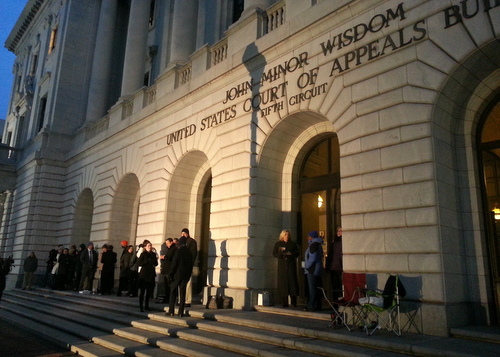
Same-sex marriage supporters began lining up outside the Fifth Circuit Court of Appeals before dawn on Friday to secure a seat in the courtroom. (Robert Morris, UptownMessenger.com)
As expected, the 5th Circuit U.S. Court of Appeals made no decision on same-sex marriage in Louisiana, Texas and Mississippi after hearing arguments Friday morning from attorneys on both sides of the issue in each state. Likewise, the U.S. Supreme Court has yet to reveal whether it will take issue up in its spring session, which would supercede any decision by the appeals court.
But the three 5th Circuit judges — Judge Jerry E. Smith and Patrick Higginbotham, two appointees of President Ronald Reagan, and Judge James Graves, appointed by President Barack Obama — did each seem to focus on different issues in their questions during Friday’s hearings, shedding some light on which issues they felt needed more elucidation.
‘The right to marry’
In the Louisiana hearing, Kyle Duncan of the Louisiana Attorney General’s office had barely begun his presentation when Higginbotham asked if the U.S. Constitution provided a fundamental right to marry.
“Probably,” Duncan replied, but said that same-sex unions would be a “brand new perspective” on marriage in the history of the institution. Throughout history, Duncan said, marriage has been considered a normal part of the procreation process, and the state has an interest in promoting strong families.
Higginbotham turned his attention to one of the landmark cases that outlined a right to marry, 1987’s Turner v. Safley, which struck down a Missouri prison regulation prohibiting the right of inmates to marry without permission from the warden. Because the inmates could not have sex with one another, they could not procreate — and yet the U.S. Supreme Court still felt compelled to ensure their right to marry.
Duncan acknowledged that other reasons to marry exist, but reiterated that procreation remains that the basic, classical reason for confining marriage to heterosexual couples.
“Those purposes are rooted in biology,” Duncan said.
“How are those purposes harmed by allowing same-sex couples to marry?” Judge Graves retorted.
Society also readily grants marriage to couples who cannot have children for medical reasons, or elderly couples, who no longer can procreate, noted Camilla Taylor of Lambda Legal in her rebuttal. Many married couples do procreate, but that’s not the only reason they wed — some do so for spiritual reasons, as a form of religious expression, for tax or insurance benefits, for affirmation of family commitments or for adoption rights.
“All of these purposes are equally important,” Taylor said.
Even the state’s assertion of marriage as a way to link children to their biological parents is a concession that marriage benefits children, Taylor said. Thus, denying the parents the right to marry places an unfair burden on their children as well.
The U.S. Constitution argues that one can only deny freedoms to individuals when there is a sound reason for it, Taylor said. If no legitimate governmental rationale can be found for dictating who can or cannot marry whom, she said, then the laws that do so “must fall.”
Judge Graves called Taylor’s argument “compelling” for recognizing gay marriages from other states, but asked whether the same arguments apply to forcing Louisiana to grant them as well.
“Would it be legally inconsistent to conclude that Louisiana should recognize same-sex marriages from other states, but also ban them here?” Graves asked.
Taylor said the same principle holds in either case — the government cannot infringe upon a person’s freedom to choose his or her spouse without a legitimate reason — and no legitimate reason has ever been outlined in the arguments thus far.
“In both cases, they’re completely inadequate,” Taylor said. “They make no sense.”
‘One discernible direction’
At a press conference outside the courthouse, the attorneys for same-sex marriage advocates in all three states said the hearings had been successful, expressing confidence in a “just” decision and praising the judges’ questions.
“They expressed significant discomfort with this discrimination,” Taylor said.
Gene Mills of the Louisiana Family Forum stood nearby, applauding Attorney General Buddy Caldwell’s team for “a masterful job defending Louisiana’s rationale for defining marriage as a legal relationship between one man and one woman.” He acknowledged that the purpose of marriage is more complex than to facilitate procreation, but the history of the institution has confined it to heterosexual relationships.
“I think it’s a valid question,” Mills said. “I don’t believe that the issue will be finally decided by a three-judge panel in the 5th Circuit.”
Mills also alluded to the most recent court ruling upholding Louisiana’s ban on same-sex marriage, in which Judge Martin Feldman said the democratic process is a legitimate way of allowing states to make their own decisions about marriage.
On Friday, Judge Smith had picked up that thought — noting that the Supreme Court’s most recent decision had not ended bans on gay marriage, but simply required the federal government to recognize each state’s decision. Smith noted, however, that the issue’s momentum seems clear.
“It is hard to deny the trajectory,” Smith said. “It is moving in one discernible direction.”

At a a Thursday night news conference, John Denison of the Forum for Equality introduces attorneys and plaintiffs in gay-marriage cases from Louisiana, Texas and Mississippi heard Friday in the Fifth Circuit U.S. Court of Appeals. (Robert Morris, UptownMessenger.com)
“It is hard to deny the trajectory,” Smith said. “It is moving in one discernible direction.”
Yep. Judges are waking up to this. Don’t want to be on the wrong side of history, like those who opposed the civil rights movement.
This isn’t about civil rights. Not unless stripping freedom of religion out of the First Amendment is a civil right.
romulus… your comment doesn’t make sense. “stripping freedom of religion from the 1st amendment”
The First Amendment (Amendment I) to the United States Constitution PROHIBITS THE MAKING OF ANY LAW RESPECTING AN ESTABLISHMENT OF RELIGION, IMPEDING THE FREE EXERCISE OF RELIGION, abridging the freedom of speech, infringing on the freedom of the press, interfering with the right to peaceably assemble or prohibiting the petitioning for a governmental redress of grievances.
Civil Rights is generally defined as guaranteeing “the rights to full legal, social, and economic equality” under the law.
Therefore, to equate Civil Rights to the marriage issue is BOTH a Civil Rights movement AND in line with the 1st Amendment’s prohibition regarding the ESTABLISHMENT of religion/religion based laws and regarding the citizen’s freedom to exercise (or not) exercise religion as THEY see fit.
This is the “discernible direction”. The “wrong” side of history is the side opposed to freedom and liberty. ie. those opposed to emancipation, expansion of property rights, women’s suffrage, racial and gender equality, etc…
The general principle is that “your rights end where mine begin”. You are free to exercise your personal rights so long as they do not infringe upon my freedom. It is therefore inevitable, like it or not, for the Constitution to prevail just as it did in the Civil Rights Movement just as with Thomas Jefferson’s Virginia Statute for Religious Freedom of 1786. Our American values are such that we place freedom and specifically freedom from state enforced religion above all else.
That was a very pretty lecture. Do you really believe human free will is illusory? Do you really believe history has a wrong side, and a rigtht side to which we’re inevitably moving? Is this pre-determined, and are we just along for the ride? If not, who gets to decide these things, and can you please explain why it’s your views that are so happily privileged against those of other times and places, guaranteeing that they will not themselves end up on the wrong side of history?
It’s hilarious how some people have managed to convince themselves this is religious persecution rather than state-sponsored discrimination. The real solution from their end should be to strip the term marriage of all legal meaning, allow anyone to enter into a union with all the legal benefits that marriage currently entails, and then keep marriages as a purely religious ceremony/institution but somehow I doubt that would go over well because we all know what this is actually about.
I don’t know how the marriage of two consenting adults in any way infringes upon your Constitutional right to practice whatever warped, primitive, twisted religion you consider yourself a part of. I won’t even bother asking you to explain because I know from past experience that you’re so wrongheaded you aren’t even able to.
Is this objective journalism?
I wonder if Duncan would consider my spouse and I married, since we have ignored and eschewed the biological purpose of marriage.
Thank you,
First, my aim was to point out that the 1st amendment guarantees freedom of and FROM religion. We are, or wish to be, a secular state. Thereby guaranteeing one’s freedom to practice or not to practice religion as they see fit. Your original comment about this particular issue “stripping freedom of religion from the 1st amendment” which sparked my reply, just is simply incorrect. The amendment itself is, by its unambiguous language, designed to prevent the establishment of laws based upon or favoring a particular religion. Therefore, as i know you noticed, i am simply arguing that the 1st amendment actually dictates the abolishment of marriage restrictions based solely upon religious bias.
Secondarily, I think that because, by our own Constitution, religion can play no part in this legislation, it is therefore a Civil Rights issue. Certain persons have been deprived of the rights and benefits of the legal status we call marriage. Should they be deprived inheritance rights, tax privileges, insurance benefits etc… just because some people, based upon “religion” choose to keep it that way?
Lastly, i said the “wrong” side because that’s how the original post by “Yet another…” termed it. But, although i would normally avoid a qualitative judgment like that, i think it fairly easy to see that expanding civil rights and eliminating injustice is probably the “right” side.
I am, enjoying this debate but I don’t understand your line of reasoning with respect the illusory nature of free will. Free will is indeed real. However, certainly government/society evolves in a discernable direction and for most of our history, the macro view of American and Western political evolution has been to favor expansion of rights not restriction. The uniqueness of the governments such as ours, born of the age of enlightenment, is that we strive to protect “discrete and insular minorities” among us. We are not, and have never been simply a “majority rules” government. We are encouraged to see beyond our own interests and see the needs of those who lack the numbers to help themselves politically. So, if its my views that are “happily privileged” its only because I agree with our Constitution.